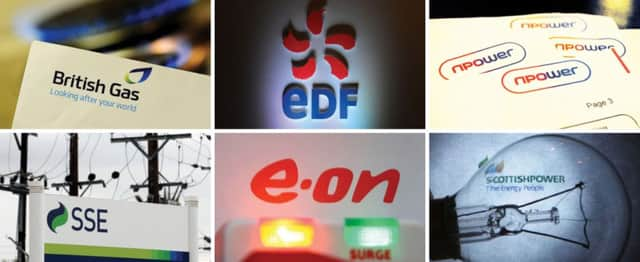How big energy suppliers overcharge their most loyal customers


The gas and electricity giants are squeezing bigger profits from the poorer and less well-educated consumers who tended to be stuck on more expensive standard deals, the Competition and Markets Authority (CMA) report indicated.
It prompted Energy Secretary Ed Davey to warn that he would “not flinch” from breaking up the firms if that action is recommended at the conclusion of the CMA investigation, which was launched last year.
Advertisement
Hide AdAdvertisement
Hide AdToday’s findings showed 95% of the UK’s 19 million dual fuel customers - those who take gas and electricity from the same company - could have saved between £158 and £234 by switching tariff or supplier.
The CMA found the Big Six had consistently charged higher prices for standard variable tariffs (SVTs) than for other deals such as fixed tariffs.
This provided “some support for the view that these suppliers can segment the market and price discriminate”.
Those stuck on these rates tended to be less well-educated, less well-off, struggling financially, less likely to own their own home and have internet access and more likely to be disabled or a single parent.
Advertisement
Hide AdAdvertisement
Hide AdBig Six firms made higher profit margins from customers taking these tariffs, the CMA said. These SVT customers were more likely to be “disengaged” from the possibility of shopping around then those on other deals.
The report said it had not yet taken a view on claims that the large suppliers “attempt to keep their SVT customers disengaged, so as to retain them on high tariffs”.
Its findings were an early update from the CMA’s full-scale probe into the sector dominated by Centrica, SSE, npower, EDF, Scottish Power and E.ON.
The CMA said it has not yet reached any conclusions. Provisional findings will be published in May.
Advertisement
Hide AdAdvertisement
Hide AdIt said standard tariff customers were more likely to be with an “ex-incumbent” supplier - the gas or electricity provider that served the area before the market was opened up to competition in the 1990s.
They tended “to think switching is a hassle, that there are no real differences between suppliers and that something may go wrong if they switch”.
The CMA found about 40% of British Gas’s domestic gas customers had been served by it for more than 10 years.
In electricity, 40-50% of domestic customers of incumbent suppliers within each region had been with their supplier for 10 years or more.
Advertisement
Hide AdAdvertisement
Hide AdThe CMA found that from 2011 to 2014, the Big Six suppliers made 12% more revenue per unit for electricity and 13% for gas from those on these standard variable tariffs than customers on fixed or other deals.
It added: “The evidence we have seen to date also suggests that the gross margins that the six large energy firms earn are higher for customers on the SVT than for those on on-standard tariffs over the last three years.”
Meanwhile the report found half of customers surveyed said they had never switched, and around a third said they had never considered switching or thought it was impossible.
Those in the latter category tended to include people aged 65 and over, those in social accommodation, customers with no qualifications and those on lower incomes.
Advertisement
Hide AdAdvertisement
Hide AdThe report acknowledged “broad public concerns” over rising prices, energy firm profits and poor standards of customer service.
From 2009 to 2013, average prices for domestic customers rose “significantly”, the report found, with electricity up 24% and gas up 27%.
Meanwhile recorded complaints to the Big Six had increased fivefold from 2007 to 2013, mainly from problems related to billing, customer services and payments.
Energy Secretary Ed Davey told BBC Radio 4’s Today programme: “If the evidence from the CMA is strong that the next step ought to be breaking up a company, if the Competition and Markets Authority recommend that... we would not flinch from taking that tough action.”
Advertisement
Hide AdAdvertisement
Hide AdShadow energy secretary Caroline Flint said: “This report confirms that Britain’s energy market is broken and that radical action is needed to protect consumers.”
Labour is pledging to freeze energy prices until 2017 if it wins the next election.
Richard Lloyd, executive director of consumer group Which?, said: “Consumers will be looking to politicians of every party to set out how they’ll deliver fair and affordable energy prices in the future.”
Mark Todd, director of comparison site energyhelpline.com, said: “We aren’t surprised by these early findings by the CMA. Loyalty, quite simply, does not pay.”
Advertisement
Hide AdAdvertisement
Hide AdGillian Guy, chief executive of Citizens Advice, said: “The Competition and Markets Authority has confirmed that millions of consumers are left paying much higher prices because they are not among the savviest who have switched.
“The market is not working if the burden is entirely on consumers to switch for them to benefit from falling wholesale costs.”